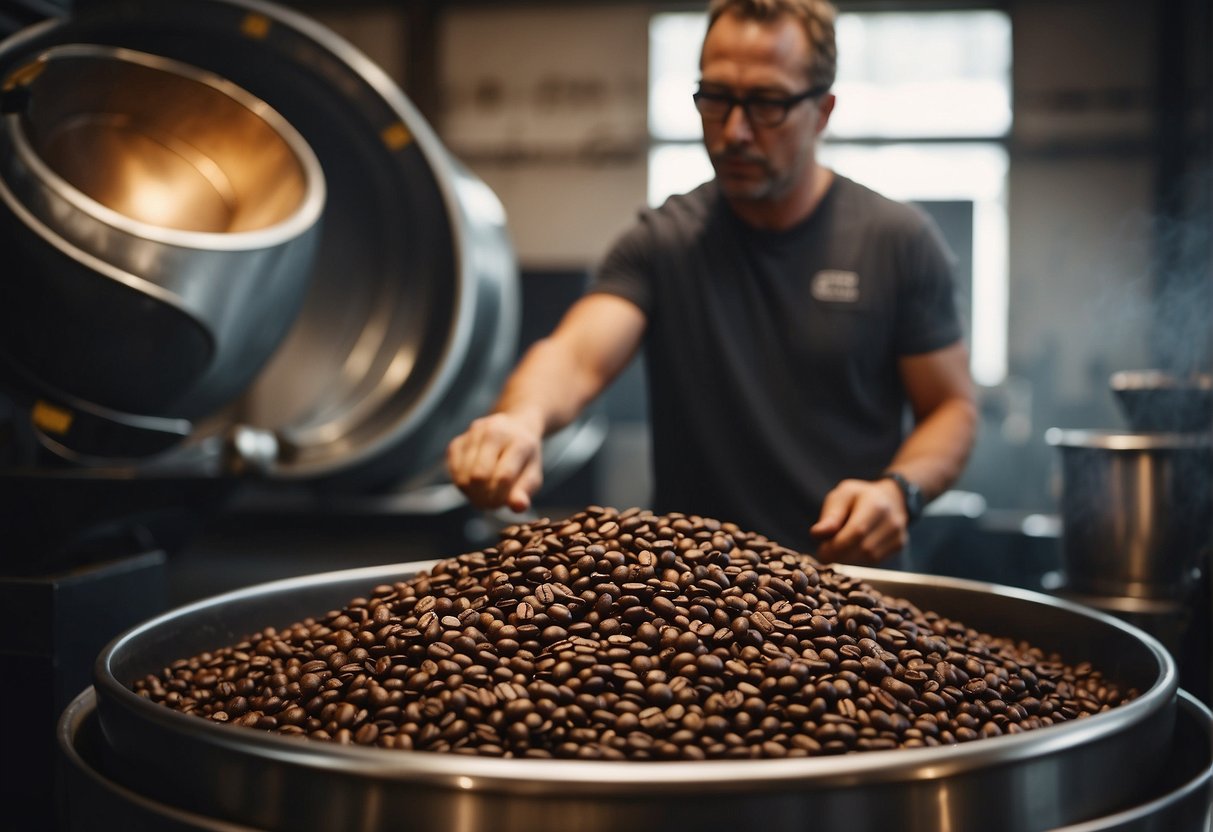Ohio has emerged as a hub for coffee enthusiasts and professionals alike, with a flourishing community of coffee roasters dedicated to the craft of transforming green coffee beans into the aromatic blends that are savored across the state and beyond. These artisans apply their extensive knowledge of bean varieties, origins, and roasting techniques to create unique profiles that cater to a wide spectrum of palates. Their commitment signifies the important role Ohio plays in the evolving American coffee industry, where locally roasted coffee is not just a commodity but a point of pride for communities.

The state’s coffee roasters, ranging from small-batch operations nestled in the countryside to larger, urban establishments, differentiate their products through meticulous sourcing, specialized roasting methods, and direct engagement with customers. They often seek sustainable and direct trade coffees, ensuring quality in each cup while fostering ethical partnerships with growers. By focusing on the entire process, from bean selection to the perfect pour, Ohio’s coffee roasters are elevating the state’s position within the national coffee scene.
Innovation and craftsmanship come together as Ohio’s coffee roasters tailor experiences that go beyond just a caffeine boost. With an array of tasting notes and roast levels, these coffee virtuosos are introducing consumers to a diverse world of flavors. Whether through online platforms or at local cafes, Ohio’s coffee roasteries are inviting spaces where the conversation about coffee culture and education continues to percolate.
History of Coffee Roasting in Ohio
https://www.youtube.com/watch?v=8b2aDIuUjGk&embed=true
Ohio has carved out a distinctive niche in the coffee roasting industry, beginning in the early 2000s when a surge of interest led local enthusiasts to venture into the artisan coffee scene. They introduced small-batch, quality-focused roasting procedures that distinguished Ohio’s coffee culture from mass-market offerings. This artisan approach emphasized the coffee’s origin, flavor, and quality, gaining a steady following among coffee aficionados.
- Artisan Coffee Roasters: Pioneers of small-batch, quality-focused roasting
- Fair Trade Commitment: Emphasis on ethically sourced beans
The state’s roasters often embrace fair trade practices, ensuring that the beans they use are ethically sourced and farmers receive fair compensation. This commitment to fair trade extends beyond mere certification; it involves building relationships with coffee farmers and participating in efforts that support sustainable coffee farming practices around the world.
Among Ohio’s contributions to the industry, there is a significant emphasis on educating consumers about the complexities of coffee—from cultivation and harvesting methods to the intricacies of roasting and brewing. Ohio roasters have fostered a coffee culture that values transparency and consumer connection, inviting coffee drinkers to explore the story behind their cup.
- Consumer Education: Highlighting the journey from bean to cup
- Culture of Transparency: Building consumer trust with open communication
The coffee landscape of Ohio continues to thrive, with roasters both new and established contributing to an ever-evolving tapestry of coffee excellence. They balance tradition with innovation to craft unique coffee experiences that resonate throughout the Buckeye State and beyond.
- Innovation and Growth: Ohio’s coffee scene is dynamic and evolving
- Tapestry of Coffee Excellence: A blend of tradition and modernity
Top Coffee Roasters in Ohio

Ohio boasts a vibrant coffee scene with numerous roasters dedicated to crafting quality brews. Among these, Crimson Cup Coffee and Donkey Coffee and Espresso stand out for their exceptional products and commitment to the coffee craft.
Crimson Cup Coffee
Crimson Cup Coffee, based in Columbus, Ohio, has been a prominent player in the state’s coffee culture since 1991. They offer a wide range of single-origin coffees and blends, reflecting their commitment to quality and sustainability. Customers can visit their flagship coffee house, which doubles as an innovation lab, diving deep into coffee brewing techniques.
Donkey Coffee and Espresso
Founded in Athens, Ohio, Donkey Coffee and Espresso is known for its cozy cafe atmosphere and strong community ties. They focus on creating an ethical and inclusive space while serving meticulously roasted coffee that delights the palates of their patrons. It’s a hub for those seeking both a cup of coffee and a place to connect.
The Coffee Roasting Process

The coffee roasting process is a critical stage that transforms the chemical and physical properties of green coffee beans into the aromatic beans that are ground and brewed to make a cup of coffee. This meticulous procedure involves selecting the highest quality beans, applying precise roasting techniques, and ensuring the proper cooling and packaging to preserve the coffee’s flavor and freshness.
Selecting Quality Beans
The selection of quality beans is paramount; it lays the foundation for an exceptional cup of coffee. Artisan coffee roasters in Ohio often source their beans from fair trade suppliers, ensuring that each bean meets stringent standards for both taste and ethical sourcing. The criteria for selection typically include bean size, density, and consistency, which are indicators of quality.
Roasting Techniques
Once the beans have been selected, they undergo various roasting techniques to achieve the desired flavor profile. Artisan roasters use methods ranging from light to dark roasts. A light roast might retain more of the bean’s original flavor characteristics, while a dark roast could offer a bolder, more pronounced taste. Roasting is about finding the right balance of temperature and time to enhance the beans’ best attributes.
Cooling and Packaging
After roasting, the beans must be cooled quickly to stop the roasting process. Efficient cooling ensures the flavor characteristics are locked in. The roasted beans are then packaged promptly, often in specially designed bags with one-way valves to allow gases to escape without letting air in, which can spoil the freshness. Proper packaging is essential in extending the coffee’s shelf life and maintaining its quality from the roaster to the consumer’s cup of coffee.
Coffee Roasteries as Community Hubs
Ohio’s coffee roasteries serve as vital nodes where community engagement and coffee culture converge. These hubs are not just points of sale but arenas for shared experiences and learning around the cherished ritual of coffee drinking.
Education and Events
Coffee roasteries frequently host educational workshops that allow patrons to deepen their knowledge of the coffee production process, from bean to cup. Events such as cuppings—where participants taste and compare different coffee flavors—are common and foster a deeper appreciation for the craft. The Ohio Roasting Company goes beyond serving up fresh coffee by inviting customers to engage with the coffee at a granular level.
Local Partnerships
Collaboration with local businesses strengthens a roastery’s ties to the community. Many Ohio coffee roasters have formed synergistic partnerships with local bakeries, artisan food producers, and even restaurants to expand their offerings. For instance, a coffee shop might showcase local pastries, or a restaurant might develop a signature coffee blend in partnership with a roaster. This not only broadens the customer experience but also reinforces the roasteries’ roles as pivotal community partners. By featuring contact information clearly on their websites, these businesses encourage direct communication and foster relationships within the community.
Sustainability and Ethical Sourcing
Ohio’s coffee roasters are increasingly emphasizing the importance of sustainability and ethical sourcing when it comes to procuring their coffee beans. This commitment ensures that farmers receive fair compensation for their labor, which can be seen in practices like Fair Trade certification. Fair Trade aims to provide reasonable prices to coffee producers, offering consumers a responsible choice.
Ethical sourcing involves more than just fair payment; it incorporates environmental stewardship and social responsibility. For example, Ohio roasters may source coffee that’s grown without harmful pesticides, promoting environmental sustainability and better health for farm communities.
Moreover, many roasters actively support initiatives that:
- Reduce water usage and improve water quality
- Enhance soil health
- Conserve energy during the roasting process
These actions not only contribute to the quality of the coffee but also to the well-being of the ecosystem where the coffee is grown. By engaging in these practices, Ohio coffee roasters show their dedication not just to a premium product, but to a healthier planet and fairer society.
Some have adopted the use of technology, such as infrared burners in their roasters, to increase efficiency and reduce their carbon footprint, demonstrating a commitment to innovation within sustainable practices.
Consumers can support these efforts by choosing coffee from roasters who prioritize these values, thus fostering a culture of mindfulness and responsibility that extends from the coffee farm to the coffee cup.
Starting a Coffee Roastery in Ohio
In Ohio, the coffee industry is flourishing, with an increasing number of specialty roasteries making their mark. Those looking to enter the business must undertake thorough planning and adhere to various regulations.
Business Planning
When starting a coffee roastery in Ohio, the business plan serves as the roadmap for success. It should detail the company’s vision, target market, competitive analysis, marketing strategies, and financial projections. An essential first step includes identifying a unique selling proposition, which could be a commitment to small batch precision as exemplified by Ohio’s own Old Hatch Coffee Roastery. Additionally, establishing a supply chain for quality green coffee beans and deciding whether to focus on wholesale, retail, or a combination is crucial.
Regulations and Compliance
Compliance with state regulations is critical for Ohio roasteries. Prospective roasters must contact local health departments to ensure their facilities meet food safety standards. They should also register their business and adhere to tax laws. For environmental compliance, attention is required to proper air quality control, as roasting generates smoke and particulates. Roasters like Backroom Coffee Roasters have navigated these regulations successfully, demonstrating it’s possible to maintain a focus on quality over quantity while meeting standards.
Each step, from planning to compliance, sets the foundation for a prospective roastery to become a staple in Ohio’s vibrant coffee scene. Entrepreneurs can contact us for more detailed insights into the Ohio coffee industry and further assistance in building their business.
